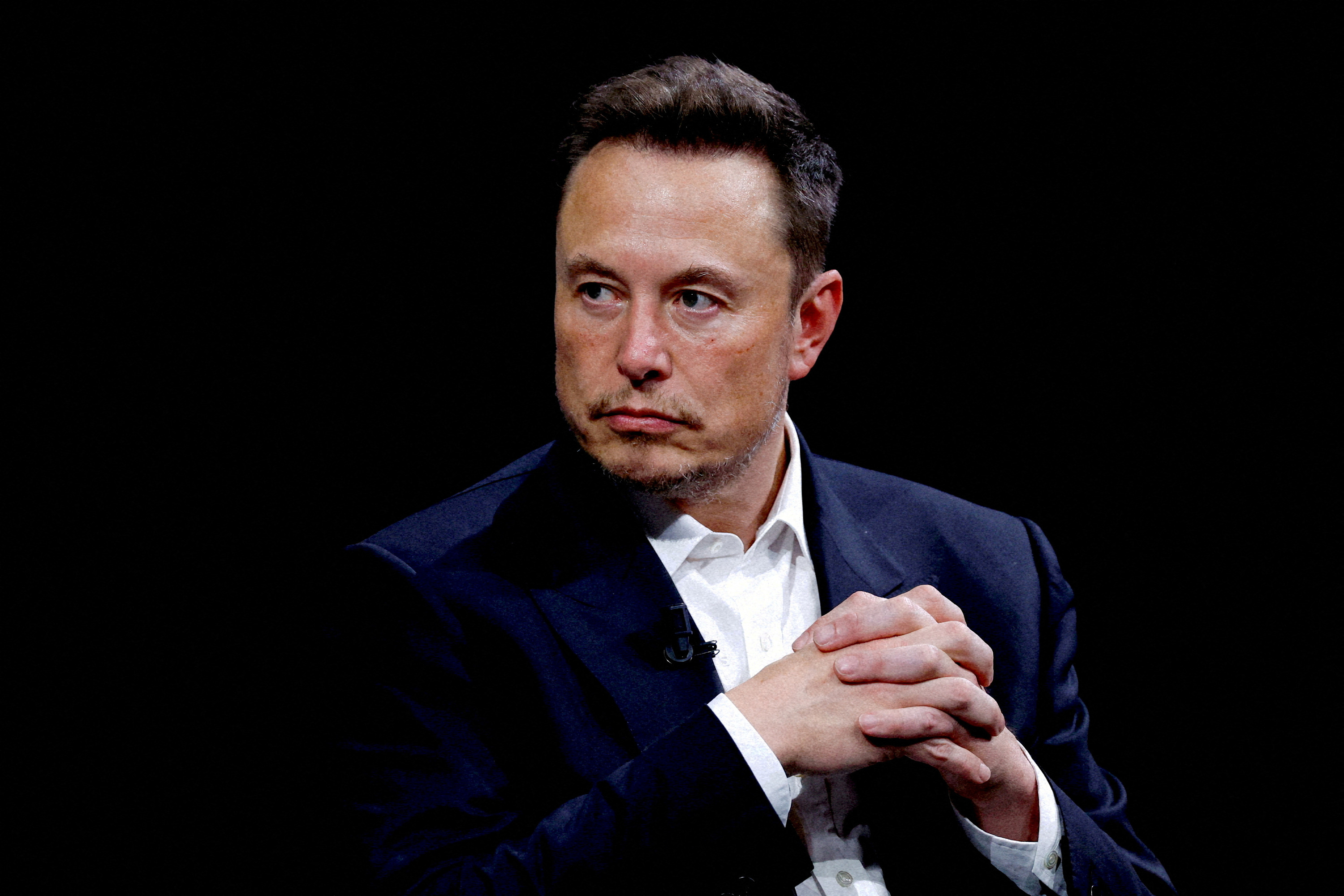Last Wednesday could be described as “Freedom Day”. Almost all corona measures expired on March 1st, only visitors to hospitals and care facilities are required to wear a mask, and that will also fall on April 7th. Is this the end of the pandemic? What balance can be drawn? And why are the measures being relaxed now?
Health Minister Karl Lauterbach (SPD) had to ask these questions on Wednesday evening in a one-on-one interview with Sandra Maischberger. The journalists Kristina Dunz and Amelie Fried and the editor-in-chief of the WELT news channel, Jan Philipp Burgard, were also invited. In the last part of the show, Maischberger conducted an interview with Hollywood actress Cate Blanchett.
"So overall it went well overall," said Lauterbach about the fight against the pandemic. Only “the long school closures” will “probably be done differently next time,” he added, shrugging his shoulders. Just a few weeks ago he had described the corona-related school closures in Markus Lanz's program as a "huge mistake". Maischberger had no trace of this remorse.
The presenter kept asking: Why hadn't the Minister of Health listened to the scientists who warned of school closures at the beginning of the pandemic? The SPD politician dodged: It was a "difficult question", now one is smarter, he said - and pushed the population's praise afterwards: "A lot of things went very well. It was a tremendous effort by the children and also by the parents, the mothers, to make this possible.”
Lauterbach admitted at least that the school closures had been too long. "We could have," he said, "handled the measures in other areas more strictly in order to compensate for what is happening at school." The journalist Kristina Dunz from the "Redaktionsnetzwerk Deutschland" also called for the focus to be on successes: "One can regret that the children have deficits in the learning material, but I think that it frustrates a lot of people when they just hear: 'It wasn't really worth it somehow and it was exaggerated anyway.'"
In addition to the school closures, Maischberger also confronted the Minister of Health with his tweets from the past. In March 2020, for example, he praised the rule of the Bavarian Prime Minister Markus Söder (CSU) that you were not allowed to go for a walk with people from your own household.
Lauterbach only seemed to be able to remember vaguely: "As far as I can remember, I praised Mr. Söder's fundamentally cautious policy at the time." Maischberger stuck to her presentation. The minister stumbled and finally said: "We must not give the impression now that a large part of the measures taken back then were wrong."
Throughout the evening, Lauterbach never managed to clearly argue why all corona measures were thrown overboard now. According to the Robert Koch Institute, the nationwide seven-day incidence had recently increased by eleven percent, even if it remained at a comparatively low level.
"In my view, the pandemic is not really over," said Lauterbach. Too many people would still become seriously ill, including from Long Covid. You have to be careful to protect high-risk patients. But it is also clear that one is in an endemic state. "We now have a situation in which individuals can protect themselves quite well," said Lauterbach. “The location is not perfect. But we cannot continue the measures forever.”
A year ago, such a sentence would have drawn a lot of criticism. The WELT journalist Jan Philipp Burgard also emphasized this: "Parts of society have been pilloried because they have critically questioned the massive restrictions on fundamental rights that existed. If you raised questions, you were sometimes portrayed as a lateral thinker.” Burgard called for a “policy of reconciliation” to counteract the division in the country.
As far as the future is concerned, one is prepared for the future, said Lauterbach. "We are better prepared for the next pandemic in many ways." The Ministry of Health has set up an expert council consisting of virologists and epidemiologists, but also, for example, paediatricians. In addition, they are now systematically on the lookout for viruses, for example in wastewater, and have concluded contracts with companies that can quickly produce vaccines in an emergency. Lauterbach said he found March 1st "liberating". But it was not a “Freedom Day”.
Maischberger also discussed the future of the traffic light coalition with her panel of experts. The starting point was the announcement by Food Minister Cem Özdemir (Greens) that he would ban the advertising of unhealthy food for children. The coalition partner FDP had described this as "unworldly".
Jan Philipp Burgard also criticized Özdemir's project: "I think that's typical green prohibition fetishism." The FDP was not informed about this project in advance, which is why the law will probably not be successful. "That suggests that this is more of a populist debate," said Burgard.
It's not the only issue on which the coalition is at odds. There are also rumblings about the ban on gas and oil heating - a proposal that the Greens had introduced. The journalist Amelie Fried criticized that the FDP was "too comfortable". "Everything that is initiated by the Greens and the SPD is always criticized," she said. "For example, I find it unspeakable that our transport minister is still against a speed limit, even though there are studies that show that it can save a lot of CO₂."
So should one doubt the future of the coalition? Jan Philipp Burgard said resolutely no: The traffic light coalition is currently a “pure partnership of convenience,” said the journalist, but it will hold for the foreseeable future: “None of the three actors have any interest in holding new elections at the moment to break the fence.”
The FDP in particular must be concerned about not reaching the five percent hurdle, as the journalist Kristina Dunz also emphasized: “The closer it gets to the time of the next election, I think we will see that the FDP under There is a lot of pressure to get back into the Bundestag.” She called on the coalition to “pull it up” and concentrate on the important things – such as the Ukraine war and its aftermath.

 Torrential rains in Dubai: “The event is so intense that we cannot find analogues in our databases”
Torrential rains in Dubai: “The event is so intense that we cannot find analogues in our databases” Rishi Sunak wants a tobacco-free UK
Rishi Sunak wants a tobacco-free UK In Africa, the number of millionaires will boom over the next ten years
In Africa, the number of millionaires will boom over the next ten years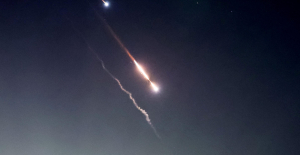 Iran's attack on Israel: these false, misleading images spreading on social networks
Iran's attack on Israel: these false, misleading images spreading on social networks New generation mosquito nets prove much more effective against malaria
New generation mosquito nets prove much more effective against malaria Covid-19: everything you need to know about the new vaccination campaign which is starting
Covid-19: everything you need to know about the new vaccination campaign which is starting The best laptops of the moment boast artificial intelligence
The best laptops of the moment boast artificial intelligence Amazon invests 700 million in robotizing its warehouses in Europe
Amazon invests 700 million in robotizing its warehouses in Europe Switch or signaling breakdown, operating incident or catenaries... Do you speak the language of RATP and SNCF?
Switch or signaling breakdown, operating incident or catenaries... Do you speak the language of RATP and SNCF? Transport in Île-de-France: operators are pulling out all the stops on passenger information before the Olympics
Transport in Île-de-France: operators are pulling out all the stops on passenger information before the Olympics Radio audiences: France Inter remains firmly in the lead, Europe 1 continues its rise
Radio audiences: France Inter remains firmly in the lead, Europe 1 continues its rise Russian cyberattacks pose a global “threat”, Google warns
Russian cyberattacks pose a global “threat”, Google warns A new Lennon-McCartney duo, more than 50 years after the Beatles split
A new Lennon-McCartney duo, more than 50 years after the Beatles split The Curse vs Immaculée: two thrillers but only one plot
The Curse vs Immaculée: two thrillers but only one plot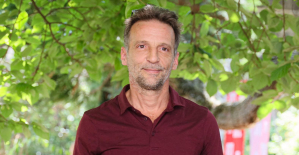 Mathieu Kassovitz adapts The Beast is Dead!, the comic book about the Second World War and the Occupation by Calvo
Mathieu Kassovitz adapts The Beast is Dead!, the comic book about the Second World War and the Occupation by Calvo Goldorak 'has never lived so much as now'
Goldorak 'has never lived so much as now' Skoda Kodiaq 2024: a 'beast' plug-in hybrid SUV
Skoda Kodiaq 2024: a 'beast' plug-in hybrid SUV Tesla launches a new Model Y with 600 km of autonomy at a "more accessible price"
Tesla launches a new Model Y with 600 km of autonomy at a "more accessible price" The 10 best-selling cars in March 2024 in Spain: sales fall due to Easter
The 10 best-selling cars in March 2024 in Spain: sales fall due to Easter A private jet company buys more than 100 flying cars
A private jet company buys more than 100 flying cars This is how housing prices have changed in Spain in the last decade
This is how housing prices have changed in Spain in the last decade The home mortgage firm drops 10% in January and interest soars to 3.46%
The home mortgage firm drops 10% in January and interest soars to 3.46% The jewel of the Rocío de Nagüeles urbanization: a dream villa in Marbella
The jewel of the Rocío de Nagüeles urbanization: a dream villa in Marbella Rental prices grow by 7.3% in February: where does it go up and where does it go down?
Rental prices grow by 7.3% in February: where does it go up and where does it go down? Europeans: the schedule of debates to follow between now and June 9
Europeans: the schedule of debates to follow between now and June 9 Europeans: “In France, there is a left and there is a right,” assures Bellamy
Europeans: “In France, there is a left and there is a right,” assures Bellamy During the night of the economy, the right points out the budgetary flaws of the macronie
During the night of the economy, the right points out the budgetary flaws of the macronie Europeans: Glucksmann denounces “Emmanuel Macron’s failure” in the face of Bardella’s success
Europeans: Glucksmann denounces “Emmanuel Macron’s failure” in the face of Bardella’s success These French cities that will boycott the World Cup in Qatar
These French cities that will boycott the World Cup in Qatar Champions League: semi-final schedule revealed
Champions League: semi-final schedule revealed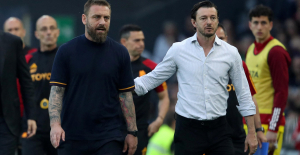 Serie A: AS Roma extends Daniele De Rossi
Serie A: AS Roma extends Daniele De Rossi Ligue 1: hard blow for Monaco with Golovin’s premature end to the season
Ligue 1: hard blow for Monaco with Golovin’s premature end to the season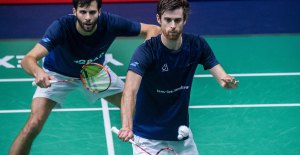 Paris 2024 Olympics: two French people deprived of the Olympic Games because of a calculation error by the international federation?
Paris 2024 Olympics: two French people deprived of the Olympic Games because of a calculation error by the international federation?







